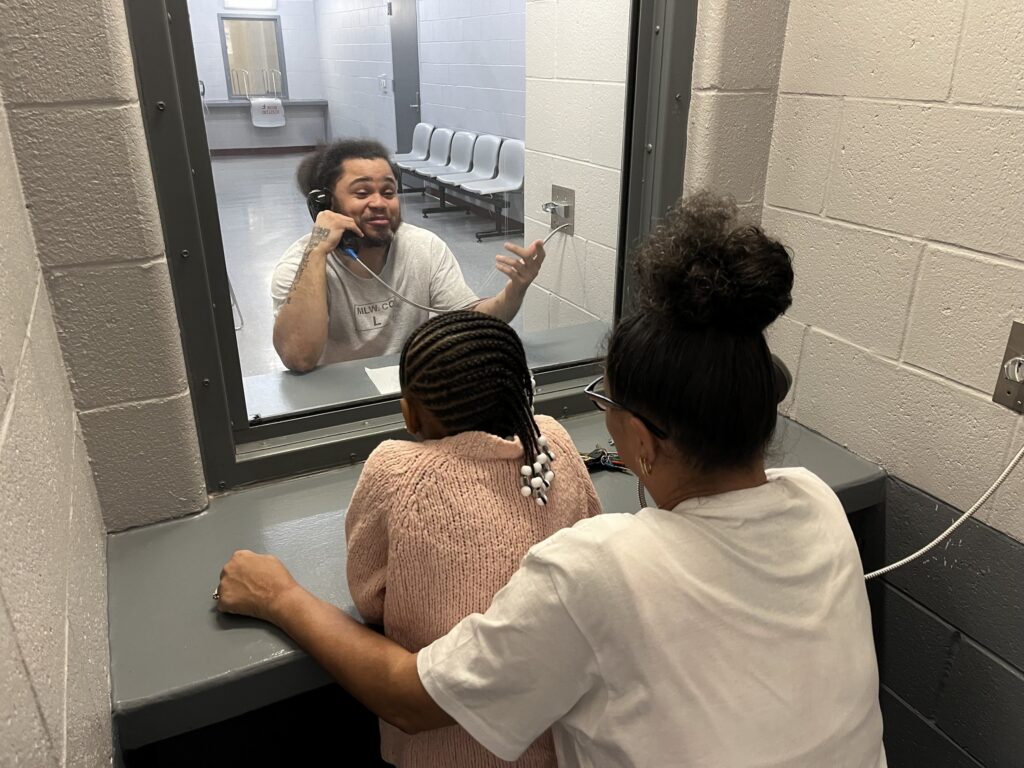Families Cheer Return of In-Person Visits to County CRC Lockup
Former House of Correction hadn't allowed such visits for a decade.

Gary Kirksey visits with his daughter and mother while incarcerated at the Milwaukee County Community Reintegration Center. Photo by Devin Blake/NNS.
Gary Kirksey could see his 6-year-old daughter’s pink sweater – her favorite color – through the glass.
He could also see that her shoes matched the sweater.
It’s details like these that people who are incarcerated can’t gather from a mere phone call.
“It’s like right here. It’s almost like I can touch them,” Kirksey said.
Jan. 7 was the first time Kirksey and his daughter were able to see each other face-to-face since he’s been incarcerated at the Milwaukee County Community Reintegration Center, or CRC, one of the county’s correctional institutions.
Visitations to the CRC, formerly known as the Milwaukee County House of Corrections, were discontinued roughly a decade ago.
While their return in December involved various stakeholders at the county level, this change is part of the overall vision of Chantell Jewell, the facility’s superintendent.
‘Social connections’
Over her nearly 30-year career in criminal justice, Jewell has learned “the importance of family and those social connections, and what that means to individuals who are justice-involved, especially those who are incarcerated,” she said.
There are roughly 1,000 individuals incarcerated at the facility.
“That support, and those connections, are critical to those who are incarcerated and really impacts their success upon release,” she said.
Kirksey’s mother, Tamara Lee, understands this all too well. Lee, who has picked up the slack with child care duties, said the hardest part of her son’s incarceration is seeing him and her granddaughter be apart.
In the case of visitation, Jewell points to a body of research that draws connections between strong families and successful re-entry into the community.
Jewell cites, for example, an analysis by the National Institute of Justice that concluded that there is a 26% decrease in recidivism for adults who were visited in prison compared to those who were not.
The institute is the research, development and evaluation agency of the U.S. Department of Justice.
Jewell said she wanted to reimplement visitation earlier in her tenure but could not because of COVID-related restrictions.
She said she believes that the criminal legal system, as a whole, does not allocate sufficient resources to support families of people who have been incarcerated.
“So now that I’m in a leadership position … I want to do everything I can to help strengthen those family bonds,” Jewell said.
Jewell said the return of visitation would not be possible without the ongoing support from Milwaukee County Executive David Crowley, who appointed her to the position of superintendent in November 2020.
The return of visitation has been life-changing for people like Gill Wing, who also is incarcerated at CRC.
He said seeing his son face-to-face has served as “a wake-up call.”
“I just had to step back and really humble myself and see where I need to go and the path that I need to follow, to be able to be a provider for him,” Wing said.
Other changes
In a news release announcing the return of visitation at CRC, Crowley said that he is “committed to making sure that people in our care at the Community Reintegration Center re-enter society better than they were before.”
To this end, Crowley has made other decisions that further support those who are incarcerated.
Crowley’s budget recommendations for 2024 included funding to help relieve families and loved ones of some of the costs associated with calling someone who is incarcerated, both at CRC and the Milwaukee County Jail.
Without this financial support, the cost to those making the calls is 16 cents per minute for a phone call and 40 cents per minute for a video call.
Lee, Kirksey’s mother, said she welcomes this change as well. Paying for calls has been a difficult cost to pay, as her income depends on social security benefits.
The county budget ultimately adopted for 2024 includes funding for 390 minutes per month for phone calls and 60 minutes per month for video calls.
Devin Blake is the criminal justice reporter for the Milwaukee Neighborhood News Service. His position is funded by the Public Welfare Foundation, which plays no role in editorial decisions in the NNS newsroom.
Families cheer the return of in-person visits at Milwaukee County Community Reintegration Center was originally published by the Milwaukee Neighborhood News Service.
If you think stories like this are important, become a member of Urban Milwaukee and help support real, independent journalism. Plus you get some cool added benefits.
Political Contributions Tracker
Displaying political contributions between people mentioned in this story. Learn more.




















